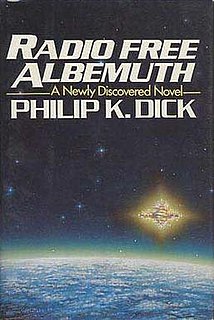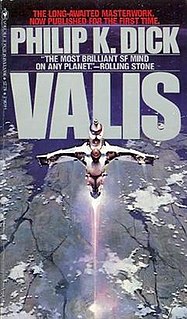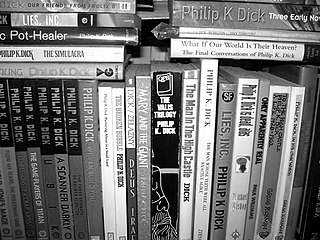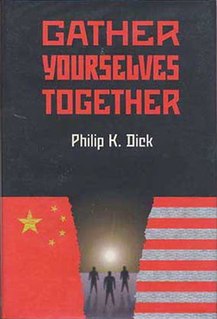
Kevin Wayne Jeter, known both personally and professionally as K. W. Jeter, is an American science fiction and horror author known for his literary writing style, dark themes, and paranoid, unsympathetic characters. He has written novels set in the Star Trek and Star Wars universes, and has written three sequels to Blade Runner.

Philip Kindred Dick was an American writer known for his work in science fiction. He produced 44 published novels and approximately 121 short stories, most of which appeared in science fiction magazines during his lifetime. His fiction explored varied philosophical and social themes, and featured recurrent elements such as alternate realities, simulacra, large corporations, drug abuse, authoritarian governments, and altered states of consciousness. His work was concerned with questions surrounding the nature of reality, perception, human nature, and identity.

A Scanner Darkly is a science fiction novel by American writer Philip K. Dick, published in 1977. The semi-autobiographical story is set in a dystopian Orange County, California, in the then-future of June 1994, and includes an extensive portrayal of drug culture and drug use. The novel is one of Dick's best-known works and served as the basis for a 2006 film of the same name, directed by Richard Linklater.

Do Androids Dream of Electric Sheep? is a science fiction novel by American writer Philip K. Dick, first published in 1968. The novel is set in a post-apocalyptic San Francisco, where Earth's life has been greatly damaged by a nuclear global war, leaving most animal species endangered or extinct. The main plot follows Rick Deckard, a bounty hunter who is tasked with "retiring" six escaped Nexus-6 model androids, while a secondary plot follows John Isidore, a man of sub-par IQ who aids the fugitive androids.

Radio Free Albemuth is a dystopian novel by Philip K. Dick, written in 1976 and published posthumously in 1985. Originally titled VALISystem A, it was his first attempt to deal in fiction with his experiences of early 1974. When his publishers at Bantam requested extensive rewrites he canned the project and reworked it into the VALIS trilogy. Arbor House acquired the rights to Radio Free Albemuth in 1985. They then published an edition under the current title, prepared from the corrected typescript given by Dick to his friend Tim Powers.

The Transmigration of Timothy Archer is a 1982 novel by American writer Philip K. Dick. As his final work, the book was published shortly after his death in March 1982, although it was written the previous year. The book was originally titled Bishop Timothy Archer.

Valis is a 1981 science fiction novel by American writer Philip K. Dick, it is one book of a three part series. The title is an acronym for Vast Active Living Intelligence System, Dick's gnostic vision of one aspect of God. The book features heavy auto-biographical elements, and draws inspiration from Dick's own religious experiences over the previous decade.
The VALIS trilogy is a set of science fiction/philosophical novels by author Philip K. Dick which include VALIS (1978), The Divine Invasion (1980), and The Transmigration of Timothy Archer (1982). Dick's first novel about the VALIS concept originally titled "VALISystem A", was published as Radio Free Albemuth after Dick's death in 1985.

The Exegesis of Philip K. Dick is a 2011 non-fiction book containing the published selections of a journal kept by the science fiction writer Philip K. Dick, in which he documented and explored his religious and visionary experiences. Dick's wealth of knowledge on the subjects of philosophy, religion, and science inform the work throughout.

The Divine Invasion is 1981 science fantasy novel by American writer Philip K. Dick. It is the second book in the gnostic VALIS trilogy, and takes place in the indeterminate future, perhaps a century or more after VALIS. The novel, originally titled Valis Regained, was nominated to the BSFA Award.

The bibliography of Philip K. Dick includes 44 novels, 121 short stories, and 14 short story collections published by American science fiction author Philip K. Dick during his lifetime.

Gather Yourselves Together is an early novel by the science fiction author Philip K. Dick, written around 1948–1950, and published posthumously by WCS Books in 1994. As with many of his early books which were considered unsuitable for publication when they were first submitted as manuscripts, this was not science fiction, but rather a work of straight literary fiction. The manuscript was 481 pages in length. At the time it was published, it was one of only two Dick novels for which the manuscript was known to exist which remained unpublished. The other, Voices from the Street, was published in 2007.
Nicholas and the Higs is one of several early, unpublished novels by American science fiction author Philip K. Dick. It was written somewhere around 1957 during the waning days of his second marriage, was re-written at the behest of his publisher in 1958, and was then ultimately rejected for publication. The original manuscripts have been lost, and no copies are known to be extant.

Radio Free Albemuth is a 2010 American film adaptation of the dystopian novel Radio Free Albemuth by author Philip K. Dick, which was written in 1976 and published posthumously in 1985. The film is written, directed, and produced by John Alan Simon and stars Jonathan Scarfe and Shea Whigham.

The Collected Stories of Philip K. Dick is a collection of 118 science fiction stories by American writer Philip K. Dick. It was first published by Underwood-Miller in 1987 as a five volume set. See Philip K. Dick bibliography for information about the mass market reprints.

The Little Black Box is a collection of science fiction stories by American writer Philip K. Dick. It was first published by Gollancz in 1990 and reprints Volume V of The Collected Stories of Philip K. Dick. It had not previously been published as a stand-alone volume. Many of the stories had originally appeared in the magazines Worlds of Tomorrow, Galaxy Science Fiction, Amazing Stories, Fantasy and Science Fiction, Famous Science Fiction, Niekas, Rolling Stone College Papers, Interzone, Playboy, Omni and The Yuba City High Times.

The Eye of the Sibyl is a collection of science fiction stories by American writer Philip K. Dick. It was first published by Citadel Twilight in 1992 and reprints Volume V of The Collected Stories of Philip K. Dick, omitting the story "We Can Remember It for You Wholesale". Many of the stories had originally appeared in the magazines Worlds of Tomorrow, Galaxy Science Fiction, Amazing Stories, Fantasy and Science Fiction, Famous Science Fiction, Niekas, Rolling Stone College Papers, Interzone, Playboy, Omni and The Yuba City High Times.
Underwood–Miller Inc. was a science fiction and fantasy small press specialty publishing house in San Francisco, California, founded in 1976. It was founded by Tim Underwood, a San Francisco book and art dealer, and Chuck Miller, a Pennsylvania used book dealer, after the two had met at a convention.

Fomalhaut is a class A star on the main sequence approximately 25 light-years (7.7 pc) from the Sun. It is the brightest star in the constellation of Piscis Austrinus and at magnitude 1.2 is one of the brightest stars in the sky.
"The Story to End All Stories for Harlan Ellison’s Anthology Dangerous Visions" (1968) is a 117-word short story by Philip K. Dick, written as an addendum, or spiritual sequel to "Faith of Our Fathers". It is a simply written account of a decadent, dystopian, post-apocalyptic society, characterised by inter-species sex, infanticide, and cannibalism. The story is symbolic and satirical, reflecting ideas of divinity and the consequences of war, themes which figure large in the author's writing.